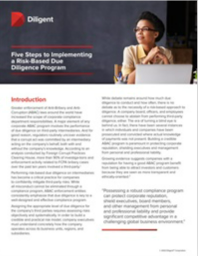Five Steps to Implementing a Risk-Based Due Diligence Program
Greater enforcement of Anti-Bribery and Anti- Corruption (ABAC) laws around the world have increased the scope of corporate compliance department responsibilities. A major element of any corporate ABAC program involves the performance of due diligence on third-party intermediaries. And for good reason, regulators routinely uncover evidence that a corrupt act was committed by an intermediary acting on the company's behalf, both with and without the company's knowledge. According to an analysis conducted by Foreign Corrupt Practices Clearing House, more than 90% of investiga-tions and enforcement activity related to FCPA bribery cases over the past ten years involved a third-party.
Read More
By submitting this form you agree to Diligent contacting you with marketing-related emails or by telephone. You may unsubscribe at any time. Diligent web sites and communications are subject to their Privacy Notice.
By requesting this resource you agree to our terms of use. All data is protected by our Privacy Notice. If you have any further questions please email dataprotection@techpublishhub.com
Related Categories: Compliance, CRM, ERP, SaaS, SAN


More resources from Diligent

Building Your Best Boardroom
How to Find the Right Directors For a Complex Future
With the advent of modern governance, directors serving on Nominations and Governance Co...

A Buyer's Guide to Audit Management Software
For today's internal audit teams, the audits themselves are only one part of a growing scope of responsibilities.
Executives rely on auditors...

Best Practices for Building a Culture of Comp...
With an evolving regulatory landscape, increased attention to political and social issues, and heightened attention to incidents and whistleblower ...